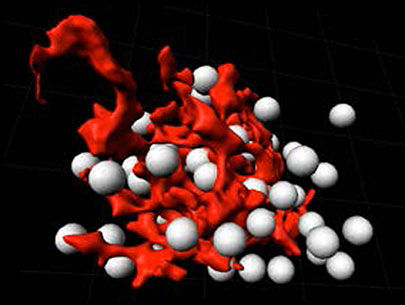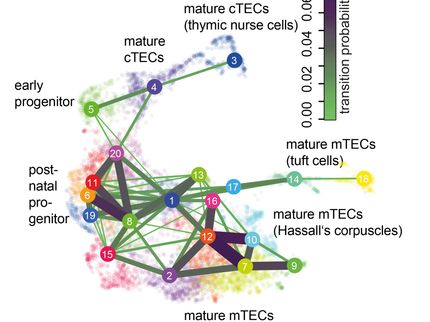Genetic Regulation of the Thymus Function Identified
Researchers at the universities of Basel and Oxford have for the first time identified all genes regulated by the protein Foxn1. The results show that Foxn1 not only plays a crucial role in development of the thymus in the embryo, but it also regulates vital functions in the developed, postnatal organ. The decryption of the protein’s functions is important in the understanding and treatment of autoimmune diseases, vaccination responses in old age and defense against tumor cells.

A single thymic epithelial cell (red) in contact with developing T cells (white).
University of Basel, Department of Biomedicine
Like all vertebrate animals, humans use T cells in immune defense in order to protect the body against infections and malignant cells. Immune cells mature in the thymus, an organ located between the sternum and heart, during the embryonic stage, but they reach full functionality only when they interact with thymus epithelial cells – the teachers of the T cell, so to speak. The thymus begins to age from the second year of life.
More than 20 years ago, researchers discovered that the protein Foxn1 plays an important role in the development and differentiation of thymic epithelial cells. But it remained unclear which target genes controlled by Foxn1 were responsible for the formation and functions of the specialized epithelial cells. It was also unclear what Foxn1 actually did after development of the thymus in the embryo.
Healthy adults do not directly depend on the work of the thymus; however, the organ’s function becomes important again once the body requires new T cells – for example, after chemotherapy or a bone marrow transplant. To prevent the patient from remaining highly immune-deficient, thymic epithelial cells have to instruct the generation of new T cells.
Genome map of the regulator Foxn1
Researchers at the University of Basel, the University Children’s Hospital Basel and the University of Oxford have now succeeded in identifying in thymic epithelial cells the DNA sequence bound by the protein. The team, led by Professor Georg A. Holländer, was able to create a genome-wide map that lists all the DNA segments regulated by Foxn1. It emerged that Foxn1 controls almost all functions of the thymus, in whole or in part. “The protein is not only involved in the development of the organ, it also remains essential for its function throughout a person's life,” says the immunologist.
The research results provide important insights into the regulatory functions of thymic epithelial cells and could contribute to the development of new strategies for maintaining the thymus function in old age. “Now that we know exactly what Foxn1 does, we can think about how we can keep the thymus functioning in old age to reduce the risk of autoimmune disease and increased susceptibility to infections and tumors,” says Holländer.
Original publication
Saulius Žuklys1, Adam Handel, Saule Zhanybekova, Fatima Govani, Marcel Keller, Stefano Maio, Carlos E. Mayer, Hong Ying Teh, Katrin Hafen, Giuseppe Gallone, Thomas Barthlott, Chris P. Ponting and Georg A. Holländer; "Foxn1 regulates key target genes essential for T cell development in postnatal thymic epithelial cells"; Nature Immunology; 2016
Most read news
Original publication
Saulius Žuklys1, Adam Handel, Saule Zhanybekova, Fatima Govani, Marcel Keller, Stefano Maio, Carlos E. Mayer, Hong Ying Teh, Katrin Hafen, Giuseppe Gallone, Thomas Barthlott, Chris P. Ponting and Georg A. Holländer; "Foxn1 regulates key target genes essential for T cell development in postnatal thymic epithelial cells"; Nature Immunology; 2016
Organizations
Other news from the department science

Get the life science industry in your inbox
By submitting this form you agree that LUMITOS AG will send you the newsletter(s) selected above by email. Your data will not be passed on to third parties. Your data will be stored and processed in accordance with our data protection regulations. LUMITOS may contact you by email for the purpose of advertising or market and opinion surveys. You can revoke your consent at any time without giving reasons to LUMITOS AG, Ernst-Augustin-Str. 2, 12489 Berlin, Germany or by e-mail at revoke@lumitos.com with effect for the future. In addition, each email contains a link to unsubscribe from the corresponding newsletter.



















































